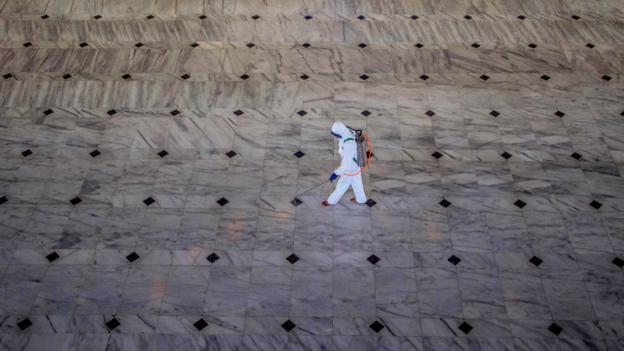
As Covid-19 has spread, so has our fear of surfaces. There are now some familiar scenes in public places around the world – people trying to open doors with their elbows, commuters studiously surfing their way through train journeys to avoid grabbing a handle, office workers rubbing down their desks each morning.
In the areas worst hit by the new coronavirus, teams of workers in protective clothing have been dispatched to spray a fog of disinfectant in plazas, parks and public streets. Cleaning regimes in offices, hospitals, shops and restaurants have been increased. In some cities, well-meaning volunteers even venture out at night to scrub the keypads of cash machines.
Like many respiratory viruses, including flu, Covid-19 can be spread in tiny droplets released from the nose and mouth of an infected person as they cough. A single cough can produce up to 3,000 droplets. These particles can land on other people, clothing and surfaces around them, but some of the smaller particles can remain in the air. There is also some evidence that the virus is also shed for longer in faecal matter, so anyone not washing their hands thoroughly after visiting the toilet could contaminate anything they touch.
It is worth noting that, according to the Centers for Disease Control and Prevention, touching a surface or object with the virus and then touching one's own face "is not thought to be the main way the virus spreads". Even so, the CDC, the World Health Organization and others health authorities, have emphasised that both washing one's hands and cleaning and disinfecting frequently touched surfaces daily are key in preventing Covid-19's spread. So although we still don't know exactly how many cases are being caused directly by contaminated surfaces, experts advise exercising caution.
You might also like:
One aspect that has been unclear is exactly how long SARS-CoV-2, the name of the virus that causes the disease Covid-19, can survive outside the human body. Some studies on other coronaviruses, including Sars and Mers, found they can survive on metal, glass and plastic for as long as nine days, unless they are properly disinfected. Some can even hang around for up to 28 days in low temperatures.
Coronaviruses are well known to be particularly resilient in terms of where they can survive. And researchers are now beginning to understand more about how this affects the spread of the new coronavirus. (Read more about the global fight against Covid-19.)
"last" - Google News
March 17, 2020 at 07:41PM
https://ift.tt/2U9FsqW
Covid-19: How long does the coronavirus last on surfaces? - BBC News
"last" - Google News
https://ift.tt/2rbmsh7
Shoes Man Tutorial
Pos News Update
Meme Update
Korean Entertainment News
Japan News Update
Bagikan Berita Ini















0 Response to "Covid-19: How long does the coronavirus last on surfaces? - BBC News"
Post a Comment